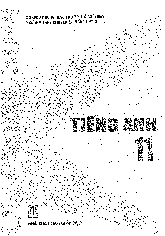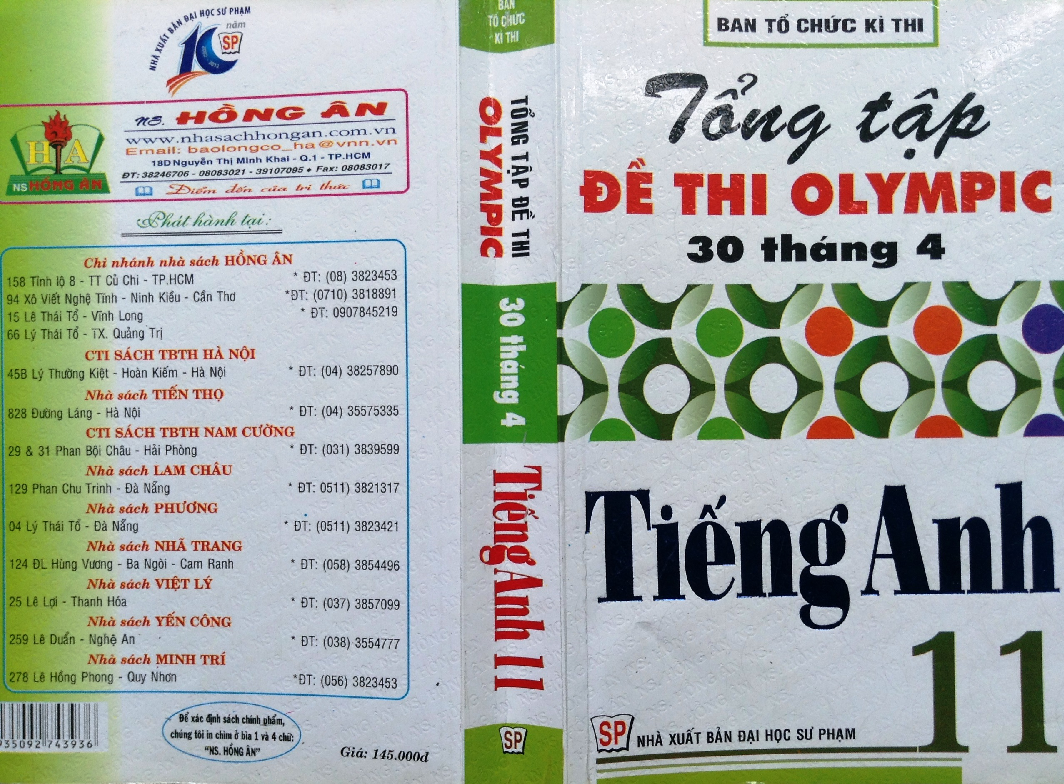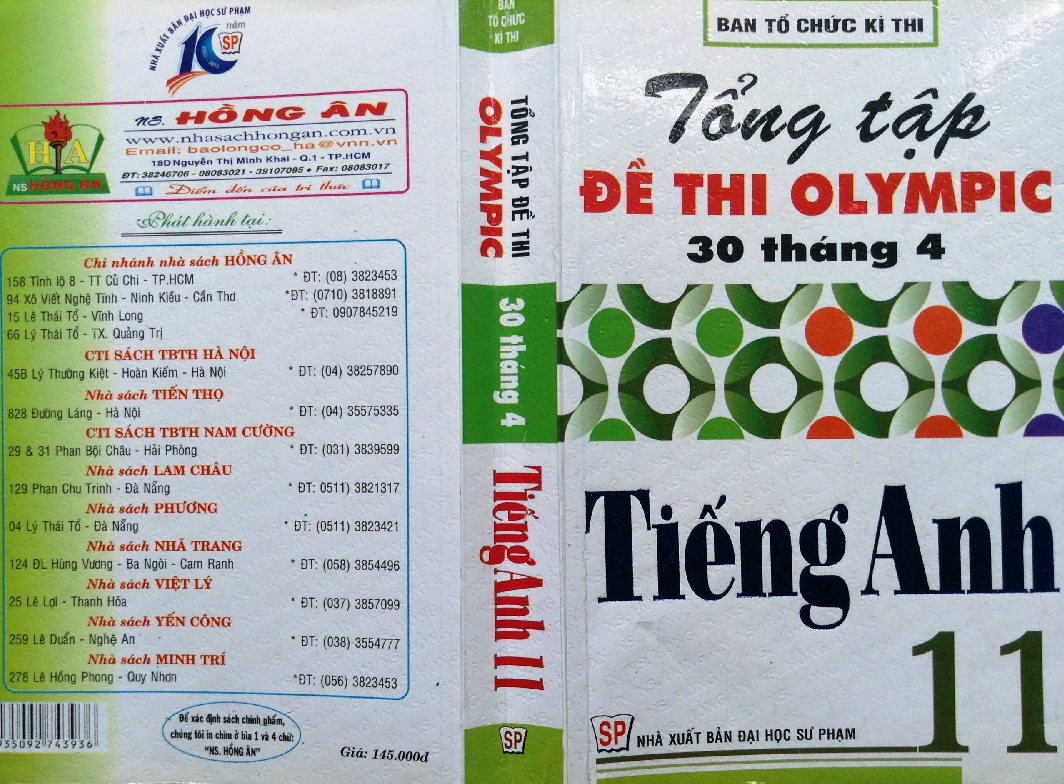









Preview text:
SỞ GIÁO DỤC VÀ ĐÀO TẠO TỈNH ĐẮK LẮK
TRƯỜNG THPT TH CAO NGUYÊN
KÌ THI OLYMPIC 10-3 LẦN IV
ĐỀ THI ĐỀ NGHỊ MÔN: TIẾNG ANH LỚP 11
PHẦN A: MULTIPLE CHOICE (40 PTS) I. PHONOLOGY (5PTS):
Choose the word whose underlined part is pronounced differently from that of the others. 1. A. experience B. expensive C. exhausted D. exclusive 2. A. vision B. measure C .usually D. pleasant 3. A. clean B. death C. head D. heavy 4. A. dinosaur B. launch C. nausea D. laurel 5. A. equation B. education C. contribution D. nomination 1.C 2.A 3.A 4.B 5.A
Choose the word which is stressed differently from the other three. 1. A. trigonometry B. explanatory C. immediately D. democracy 2. A. legislature B. repository C. magnificent D. mistake 3.
A. argumentativeB. psychological C. contributory D. hypersensitive 4. A. photograph B. payroll C. accent D. regretful 5. A. majority B. ceremony C. astronomy D. investiture 1.A 2.A 3.C 4.D 5.B II. WORD CHOICE: (5PTS)
1. If Harold………….with his piano playing, he could eventually reach concert standard. A. sustains
B. perseveres C. maintains D. survives
2. Anna is a very nervous child and she’s very………………….of strangers. A. terrified B. frightened C. petrified D. horrified
3. I love the painting of an ald man. He has such a beautiful……………smile. A. childhood B. childish C. childless D. childlike
4. She caught a ……………………of the thief as he made his get- away. A. glance B. sight C. glimpse D. flash
5. Frank has a house in the ……………….. A. outskirts B. edges C. limits D. suburds
6. The film lasted every three hours with…………….of 15 minutes between part one and part two. A. a pause B. an interruption C. an interval D. a stop
7. The person who writes symphonies or concertos is a …………….. A. composer B. conductor C. pianist D. playwright
8. Is it far to Stambord? It’s only………………..from here. A. stone’s cut B. bird’s eye view C. short cut D. step in the right direction
9. She loved tennis and could watch it till the _____ came home. A. she B. everyone C. horses D. cows
10. He set one alarm-clock for five o’clock and the other for five past so as to _____ that he did not oversleep. A. assure B. ensure C. insure D. reassure 1.B 2. A 3. D 4. C 5. D 6. C 7. A 8. A 9. D 10. B
III. STRUCTURE AND GRAMMAR: (5PTS)
Choose the best options to complete the following sentences.
1. It was only _____ he told me his surname that I realised that we had been to the same school . A. then B. until C. as soon as D. when 2.
He got an excellent grade in his examination _____ the fact that he had not worked particularly hard . A. on account of B. because C. in spite of D. although
3. It turned out that we ______ rushed to the airport as the plane was delayed by several hours . A. hadn’t B. should have C. mustn’t D. needn’t have
4. It was a service…………..I will be enternally grateful. A. to which B. for which C. to whom D. for whom
5. Tom and Mary never came to class late. .................................. A. So did we B. Neither did we C. We did either D. Neither we did
6. I remember ....................to Hanoi when I was a very small child. A. taking B. to take C. to be taken D. being taken
7. Helen asked me ......................the film called “Star Wars”. A. if I had seen
B. have I seen C. have you seen D. if had I seen
8. At first I found ......................to get used to .....................on the other side of the road. A. it difficult - drive B. difficult - drive C. it difficult - driving D. difficult- driving
9. Had we known your new address, we .................to see you.
A. would have come B. will come C. would come D. came
10. .................had they recovered from the first earthquake when they felt the second tremor. A. Scarely B. Never C. No sooner D. Just 1.D 2. C 3. D 4. B 5. B 6. D 7. A 8. C 9. A 10. A
IV./ PREPOSITIONS AND PHRASAL VERBS:( 5PTS )
Choose the best option to complete each of the following sentences.
1. They were very kind. They ……………... until I found a place of my own A. pick me up B. back me up C. put me up D. bring me round
2. The police are ………….. a spate of burglaries in the area. A. looking out for B. seeing off C. taking down D. looking into
3. I thought your speech went …………… quite well last night. A. down B. on C. by D. out
4. If you can bear …………….. me a little longer, I’ll give you all the information together. A. out B. up C. with D. on
5. The food at that restaurant was labelled “ unfit …………. human consumption.” By the environment officer. A. to B. for C. at D. in
6. It took me some time to figure …………. what the homework assignment was. A. on B. out C. to D. for
7. The company finally decided to set ………….. its own website. A. out B. off C. up D. on
8. I’ll just jot ………….. a few details in case Iforget something. A. of B. about C. down D. into
9. I’m wary …………... riding that horse; it’s been known to shy at traffic. A. of B. at C. on D. in
10. My uncle deals …………….. antique furniture. A. out B. in C. with D. for
KEYS: 1. C 2. D 3. A 4. D 5. B 6. B 7. C 8. C 9. A 10. B V. READING PASSAGE (10PTS)
Read the text below and choose the best answer to each question. Passage A.
The word laser was coined as an acronym for Light A mplification by the Stimulated
Emission of Radiation. Ordinary light, from the Sun or a light bulb, is emitted spontaneously,
when atoms or molecules get rid of excess energy by themselves, without any outside
intervention. Stimulated emission is different because it occurs when an atom or molecule
holding onto excess energy has been stimulates to emit it as light.
Albert Einstein was the first to suggest the existence of stimulated emission in a paper
published in 1917. However, for many years physicists thought that atoms and molecules
always were much more likely to emit light spontaneously and that stimulates emission thus
always would be much weaker. It was not until after the Second World War that physicists
began trying to make stimulated emission dominate. They sought ways by which one stomp
or molecule could stimulate many others to emit light, amplifying it to much higher powers.
The first to succeed was Charles H. Townes, then at Columbia University in New York.
Instead of working with light, however, he worked with microwaves,which have a much
longer wavelength, and built a device he called a “maser”, for Microwave Amplification by
the Stimulated Emission of Radiation.Although he thought of the key idea in 1951, the first
maser was not complete until a couple of years later. Before long, many other physicists were
building masers and trying to discover how to produce stimulated emission at even shorted wavelengths.
The key concepts emerged about 1957, Townes and Arthur Schawlow,then at Bell
Telephone Laboratories, wrote a long paper outlining the conditions needed to amplify
stimulated emission of visible light waves. At about the same time, similar ideas crystallized
in the mind if Gordon Gould, then a 37- years- old graduate student at Colunbia, who wrote
them down in a series of notebook. Townes and Schawlow published their ideas in a scientific
journal, Physical Review Letters, but Gould files a patent application. Three decades later,
people still argue about who deserved the credit for the concept of the laser.
1.The word “coined” in line I could best be replaced by ……………… A. created B. mentioned C. understood D. discovered
2. The word “intervention” in the first paragraph can best be replaced by ……………. A. need B. device C. influence D. source
3. The word “it” in the last line of the first paragraph refers to …………….. A. light bulb B. energy C. molecule D. atom
4. Which of the following statements best describes a laser?
A. A device for stimulating atoms and molecules to emit light.
B. An atom in a high-energy state
C. A technique for destroying atoms or molecules
D. An instrument for measuring light waves
5. Why was Townes’ early work with stimulated emission done with microwaves?
A. He was not conversed with light amplification
B. It was easier to work with longer wavelengths
C. His parents Schawlow had already begun work on the laser
D. The laser had already been developed
6. In his research at Columbia University, Charles Townes worked with all of the following EXCEPT. A. stimulated emission B. microwaves C. light amplification D. a maser
7. In approximate what year was first maser built? A. 1917 B. 1951 C. 1953 D. 1957
8. The word “emerged” in paragraph 4 is closet in meaning to ……………… A. increased B. concluded C. succeeded D. appeared
9. The word “outlining” in paragraph 4 is closet in meaning to …………….. A. assigning B. studying C. checking D. summarizing
10. Why do people still argue about who deserves the credit for the concept of the laser?
A. The researchers notebooks were lost
B. Several people were developing the idea at the same time
C. No one claimed credit for the development until recently
D. The work is still incomplete
KEYS: 1. A 2. C 3. B 4. A 5. B 6. C 7. C 8. A 9. A 10. B Passage 2:
Sleep is a natural process, and although a lot have been written about the subject, it is still
surrounded by mystery. It is used by some as an escape from the world, and regarded by
others as an irritating waste of time: some people get by on very little, others claim they can
not exist without at least ten hours, but nobody can do without sleep completely.
Our night’s sleep does not just consist of a steady phase of gradually deepening sleep. It
alternates between two stages: Non-dreaming or ordinary sleep, and REM ( rapid eye
movement ) or dreaming sleep. As soon as we fall asleep, we go straight into non-dreaming
sleep for an hour or so, then into REM sleep for about 15 minutes, then back into
non-dreaming sleep. It alternates in this way for the rest of the night, with non-dreaming sleep
tending to last longer at the beginning of the night. Non-dreaming sleep occupies
three-quarters of our night’s sleep, about a quarter of it deep and the rest fairly light.
It is widely believed that sleep repairs the body and makes good the damage caused by
being awake. However, its main function is to refresh the brain. Experts believe that probably
only about two-thirds of our sleep is necessary for repairing and refreshing the brain, with the
most valuable sleep coming in the first few hours of the non-dreaming period, the last few
hours of sleep are not so essential. The brain can manage quite well with reduced sleep as
long as it is uninterrrupted sleep. The quality of sleep is important. A study conducted in the
USA looked at short sleepers, who slept for 5.5 hours on average, and long sleepers, who had
8.5 hours or more. It is discovered after a variety of tests that the long sleepers were poor
sleepers, had twice as much REM sleep as the short sleepers, appeared to sleep longer to
make up for poor sleep, and did not wake up in the morning refreshed. Similarly, people who
sleep deeply are not necessarily getting a better quality of sleep than shallow sleepers. Deep
sleepers can feel tired the following day, so six hours of good sleep is worth more than eight hours of troubled sleep.
1. It can be concluded fron the first paragraph that …………….. .
A. people need equal time of sleep B. sleep remains a puzzle
C. sleep is among the processes of the nature
D. everything about sleep has been brought to light
2. All the following statement aer true, EXCEPT for ………………… .
A. we spend only 25 percents of our night’s sleeping time to dream
B. our night’s sleep occurs in a straight line of only two phases
C. all sleeps are similar in the alternatives of the two stages during the night
D. we often have no dreams right after we fall asleep
3. Unlike the common belief, sleep helps ………………….. . A. not to be awake B. us to repair our body
C. our brain to rest and recover
D. us to fix the damage happening by day
4. This passage is the most likely taken from ……………….. A. A health magazine B. A doctor’s description C. A fashion magazine D. An advertisement
5. It can be inferred from the expert’s ideas that …………………... .
A. Nearly 70% of our sleep is invaluable B. REM makes good our brain
C. Dream enables our body to refresh
D. If we can sleep uninterruptedly, it is not necessary to sleep the whole night
6. The study in the USA suggested that ……………..
A. the fewer hours we sleep, the more we dream
B. the type of sleep is more important than its length
C. Deep sleep means better sleep
D. Six hours of sleep is better than eight hours.
7. Which of the following is NOT discussed in the passage?
A. The problem with sleepless people C. The circle of a sleep B. The role of the sleep D. Types of sleep
8. The word “occupies” in paragraph 2 could be best replaced by ……………… . A. accounts for B. takes care of C. works out D. goes up
9. The word “irritating” in paragraph 1 most likely means …………….. . A. comforting B. annoying C. calming D. soothing
10. The word “ it” in paragraph 2 refers to …………….. A. the REM B. the night C. the ordinary sleep D. our night’s sleep
KEYS: 1. B 2. B 3. C 4. A 5. D 6. B 7. A 8. A 9. B 10. D
VI./ GUIDED CLOZE TEST ( 10 PTS )
Read the following passages and mark the letter A,B,C,or D to indicate the correct potion for each of the blanks. Cloze test 1.
To most people, landfill site is simply holes in the ground where waste material is buried.
To garbologists, however, they provide a valuable (1) …………… of information about
population’s activities in areas such as food consumption and waste disposal. Garbology is a
branch of ethnography, a science which abandons traditional methods of (2) ……………
market research information,such as questionnaires and focus groups, in favour of (3)
…………….observation of people and their habits.
The world’s (4) …………….. garbologist, Professor William Rathje, is also an
archaeologist. Archaeologists study past cultures by examining the (5) …………….. of
objects and buildings. But the basic principles of archaeology can also be applied to the
discarded rubbish of present-day civilizations in order to (6) ……………. A better
understandingof how people behave now. As founder and director of the Garbage Project at
the University of Arizona, Professor Rathje has (7) ………….. over 30 years of his life to the
archaeological study of modern refuse.
His work is of great sinterest to commerce; companies need to understand the lives of
their consumers in order to create brands which will be of most (8) ………… to them.
Rathje’s (9) ………… can help them achieve this. In addition,his analysis of the composition
of landfill sites reveals a greater need not only to recycle more rubbish, but also to (10)
…………….. down on the amount of rubbish we produce in the first place. 1. A. spring B. origin C. source D. fountain 2. A. holding B. meeting C. obtaining D. comprising 3. A. near B. close C. tight D. hard 4. A. heading B. leading C. charging D. fronting 5. A. rests B. ruins C. relics D. remains 6. A. gain B. learn C. make D. gather 7. A. conveyed B. devoted C. apportioned D. spent 8. A. function B. serving C. use D. purpose 9. A. outcomes B. findings C. implications D. derivations 10. A. lower B. cut C. bring D. get
KEYS: 1. C 2. C 3. B 4. B 5. D 6. A 7. B 8. C 9. B 10. B Cloze test 2
Many species of animals and plants have disappeared from the earth. They have died out,
or become extinct. But sometimes anomals or plant (1) …………… can be found buried in
rocks. These are called fossils. Imprints in rocks ( paw prints, for example ) are also called fossils.
Not every creature (2) …………. as a fossil. Many simply rot away completely and
leave no (3) …………… . of their existence. Because many creatures and plants have
disappeared without leaving any fossils, we will never know anything about them.
The study of fossils, or paleontology, to give it its scientific name became established
at the beginning of the nineteenth century. Before this research began, people did not believe
that fossils had once been …………… .large fossil teeth were seen as evidence of a race of
giants in the past, while ammonites, a very common type of fossil which you might easily find
yourself on a beach or among rocks,were called snakestones because of their snake-like (5)
……………. People believed that snakes had been (6) ……………. To stone by a miracle.
The most famous fossils of all are the dinosaurs. There are, of course, no dinosaurs on (7)
………… in zoos. They were not hunted to extinction by humans as some animals have been,
but became extinct millions of years before our own species developed. The reason why the
dinosaurs became extinct is still a mystery. Many theories have (8) ………….. the
disappearance of dinosaurs with major (9) ……………. change.
One possibility is that a gigantic meteorite crashed into the earth (10) ………….. so much
dust into the atmosphere that the amount of sunlight was reduced. The temperature would
have fallen and, as a consequence, many types of plants and animals would have become extinct. 1. A. ones B. remains C. parts D. evidence 2. A. continues B. lasts C. survives D. develops 3. A. proof B. marks C. trace D. remnants 4. A. flesh B. physical C. living D. alive 5. A. manner B. type C. shape D. figure 6. A. ossified B. petrified C. made D. turned in 7. A. display B. exhibition C. appearance D. sight 8. A. joined B. connected C. explained D. initiated 9. A. weather B. temporal C. climatic D. seasonal 10. A. putting B. disturbing C. displacing D. pushing
KEYS: 1. B 2. C 3. C 4. D 5. C 6. D 7. A 8. B 9. C 10. A B. WRITTEN TEST (70PTS) I. CLOZE TEST (70PTS):
Read the text below and think of the word which best fits each space. Use only ONE WORD for each space. Passage 1:
Advances in technology have done much to change the way we live and communicate, but no
breakthrough revolutionized life as much as the advent of wireless technology, according to a
panel of experts assembled by CNN 2010. Back in 1980, when it (1) __________ to
communication technology, telephones were stuck to walls, facts were found in books, and
people had to browse shelves in a record store if they wanted to buy the latest music.
However, developments that occurred at the start of the twenty century (2) __________we
could access all that information just by reaching into our pockets for our mobile phone. Form
the (3) __________ beginning of the Information Age, having immediate access to data was
fundamental to progress. In some cases, technological advances (4) __________to overhaul
industries at a lightning –fast pace. For example, the internet helped tech-savvy music lovers
to force changes in the way the music industry did (5) __________, while text messaging over
cell phones made written (6) __________more immediate.
We embraced information technology to such an (7) __________that having computer access
in our homes was not (8) __________enough. We wanted to use these tools everywhere.
Wireless hot spots popped up in cafes, airports, universities – even the whole city blocks. And
just as computer use worldwide exploded, the brains behind them – the processors – became
increasingly smaller. A computer chip that you could balance on your fingertips could hold
massive (9) __________of data. This ability to store portable. The entertainment industry
harnessed satellite technology to give consumers more choice, and video game technology
developed to the (10) __________where it became a $ 10 billion a year industry, producing
games that invite players into a virtual world of fantasy, sport or even war. KEYS: 1. came 2. meant 3. very 4. served 5. business
6. communication 7. extent 8. quite 9. amounts 10. point Passage 2:
For good or bad, computers are now part of our daily life. Experts predict that before
long all schools and businesses and most rich families in rich parts of the world will (1)
__________ a computer of some kind. Among the general public, computers arouse strong
feelings - people either love them (2) __________ hate them. The computer lovers talk about
how useful computers can be in business, in education and (3) __________ the home. Apart
(4) __________ all the games, you can do your accounts on them, learn languages from them,
write letters on them and even (5) __________ your shopping with them. Computers, they
say, bring leisure, as many (6) __________ jobs are done by computerized robots.
The haters, on the other hand, argue that computers bring not leisure but (7) __________
They worry, too, that those (8) __________ spend all the time talking to computers may
forget (9) __________ to talk to each other. Their biggest fear is that computers may
eventually take (10) __________ all human activities. KEYS: 1. own 2. or 3. in 4. from 5. do
6. unpleasant 7. unemployment 8. who 9. how 10. over II. WORD FORMATION (20PTS)
PART 1: Complete the sentences with the correct form of the word given:
1. Some people strongly _______ being told what to do by a machine. (LIKE)
2. Many old industries _______ a long time ago, and won’t return. ( APPEAR)
3. New technology is vital if we want to have high _______ growth. (ECONOMY)
4. The factory has made more goods in a shorter time for less money; on other words _______ has risen a lot. (PRODUCE)
5. The firm is being very _______ about the design of its new hardware. (SECRET)
6. It is becoming _______ obvious that changes will have to take place. ( INCREASE)
7. He was a little _______ about how to use the complicated new software. ( SURE)
8. It was never _______ true that all the work was done by hand. ( WHOLE)
9. He’s so _______ that sometimes he leaves everything switched on. (FORGET)
10. That sentence is completely _______; it makes no sense at all. (MEAN) KEYS: 1. DISLIKE 2. DISAPPEARED 3. ECONOMIC 4. PRODUCTION 5. SECRETIVE 6. INCREASINGLY 7. UNSURE 8. WHOLLY 9. FORGETFUL 10. MEANINGLESS
PART 2: Read the text below. Fill in each of blank space with the correct form of the word from the box.
FERTILE DEVELOP VALUE SOLVE ADEQUATE SCIENCE
POLLUTE PLACE PARTICULAR UTILISE
Recently (1) _______ have become extremely worried about the world’s population. The
problem is particularly acute in the (2) _______ countries. Unfortunately, the natural
resources are becoming (3) _______ for the support of the increasing population. But the (4)
_______ of natural resources by artificial products is not always possible. Therefore, it is
necessary to conserve these (5) _______ resources for as long as possible. Although the (6)
_______ of artificial products is often important, this is (7) _______ so in agriculture. For
without (8) _______ it would be impossible to increase food production, even though there is
a risk of (9) _______ by their use. One is left with the (10) _______ problem of larger
populations requiring more and more food. KEYS:
1. SCIENCE → SCIENTISTS 2. DEVELOP → UNDERDEVELOPED 3. ADEQUATE → INADEQUATE 4. PLACE → REPLACEMENT 5. VALUE → VALUABLE 6. UTILISE → UTILISATION 7. PARTICULAR → PARTICULARLY 8. FERTILE→ FERTILIZERS 9. POLLUTE → POLLUTION 10. SOLVE → UNSOLVED III.
ERROR CORRECTION (10PTS):
There are ten mistakes in the following paragraph. Identify and correct them. Line 1
Nutrients like magnesium and vitamin C are quickly depleted during Line 2
stressful times. Luckily, many vegetables containing these very Line 3
nutrients, as well as tension-reducing omega-3 fatty acids and B Line 4
vitamins that fight anxious and depression. Line 5
The potassium and magnesium find in some vegetables can also calm Line 6
you on the inside as they relax bloody vessels and keep your blood Line 7
pressure up, according to research. And fiber keeps blood sugar levels Line 8
stable, preventing dips on energy and the associated mood swings. Line 9
To reduce stressful, eat any vegetable. Mushrooms, leafy greens,
Line 10 squash, potatoes, bell peppers, spinach, bok choy, fennel, string beans Line 11
and edamame are especially good resources of serveral vitamins and Line 12 minerals.
Line 13 For a no-fuss way to consume fewer vegetables and combat stress, add
Line 14 leafy greens, mushrooms and peppers away your sandwiches, wraps,
Line 15 soups, pizza, tomato sauce and omelets. KEYS Lines Mistakes Correction Lines Mistakes Correction line 2 containing contain line 8 on in line 4 anxious anxiety line 9 stressful stress line 5 find found line 11 resources sources line 6 bloody blood line 13 fewer more line 7 up down line 14 away to
IV SENTENCE TRANSFORMATION (20PTS) IV. SENTENCE TRANSFORMATION
Finish the second sentence without changing the meaning by using the words given at the beginning.
1. Thanks to Laura’s support, I was able to finish the project.
→Had __________________________________________________________.
2. The fox was unsuccessful in reaching the grapes.
→The fox tried in___________________________________________________________.
3. He must pass his English examination, which is obligatory.
→ It ______________________________________________________________________.
4. They had such a fierce dog that nobody would visit them.
→ So___________________________________________________________________.
5. Most of the students ignored what the teacher was saying.
→ Few_______________________________________________________________.
Rewrite the sentences in such a way that the second sentence has the same meaming as
the first one, using the given words.
6. The rain was coming down in torrents. (CATS)
_________________________________________________________________________.
7. I do wish you would stop biting your nails, Brian! It really annoys me. (NERVES)
→ ___________________________________________________________.
8. We would get the job finished much quicker if everyone worked as hard as everyone else. ( WEIGHT)
→ ___________________________________________________________.
9. She was so beautiful that I couldn’t stop looking at her. (EYES)
→ _____________________________________________________________________.
10.Will you please stay with me for a while? ( COMPANY )
→ _______________________________________________________________. KEYS
1. Had it not been for Laura’s support, I couldn’t have finished the project.
2. The fox tried in vain to reach the grapes.
3. It is obligatory that he should pass / pass his English examination.
4. So fierce was their dog that nobody would visit them.
5. Few students paid attention to / took notice of / listened to what the teacher was saying.
6. It was raining cats and dogs.
7. I do wish you would stop biting your nails, Brian! It really gets on my nerves.
8. We would get the job finished much quicker if everyone pulled their weight.
9. I couldn’t take my eyes off her.
10. Will you please keep me company for a while? ------THE END--------




